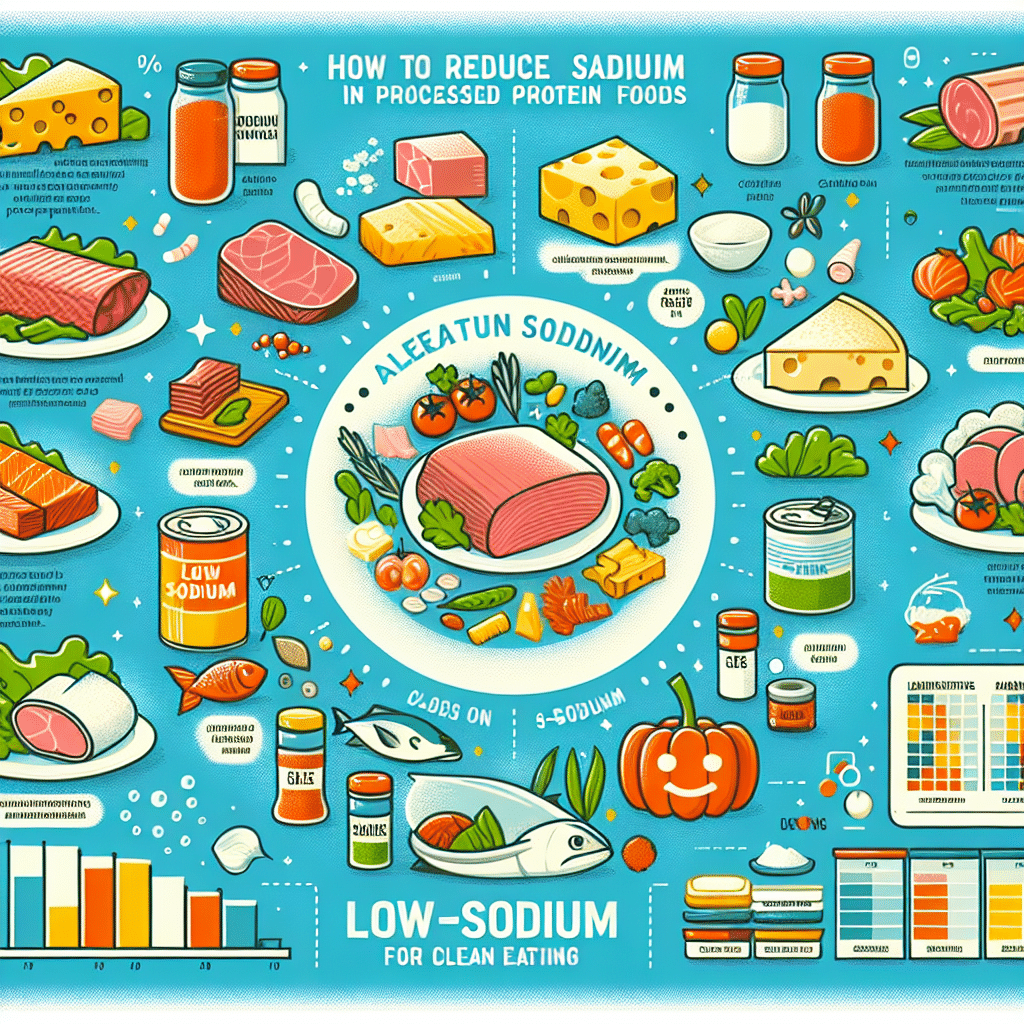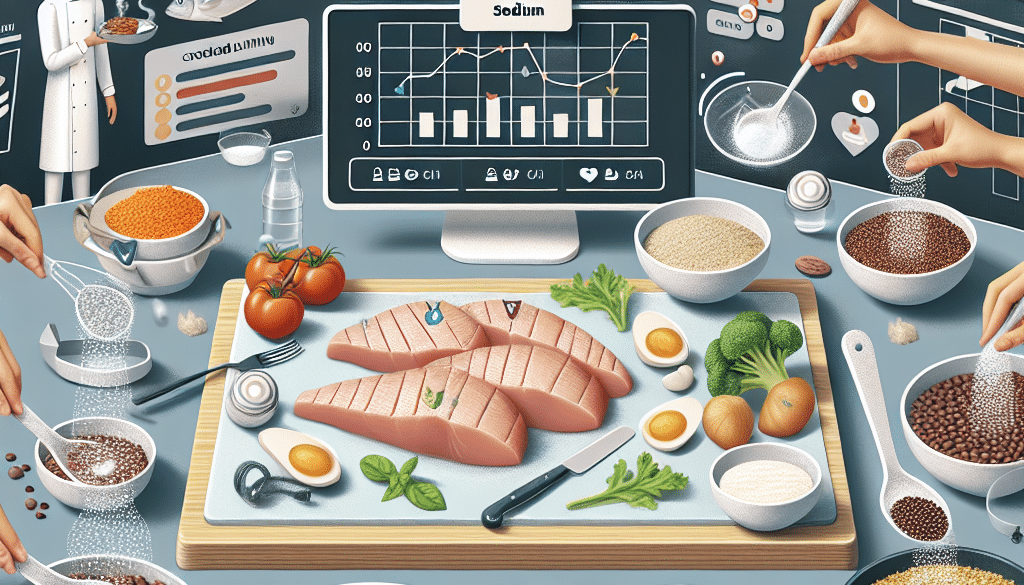Reducing Sodium in Processed Protein Foods: Clean Eating
-
Table of Contents
- Reducing Sodium in Processed Protein Foods for Clean Eating
- The Sodium Dilemma in Processed Protein Foods
- Health Implications of Excessive Sodium Intake
- Strategies for Sodium Reduction in Processed Proteins
- Reformulation by Manufacturers
- Consumer Choices and Cooking Practices
- Case Studies and Success Stories
- Statistics on Sodium Reduction Efforts
- Conclusion: Embracing Low-Sodium Processed Proteins for Healthier Eating
- ETprotein: Your Partner for High-Quality, Low-Sodium Protein Products
Reducing Sodium in Processed Protein Foods for Clean Eating

In recent years, the health and wellness community has increasingly emphasized the importance of clean eating, which involves choosing whole foods in their least processed forms. However, for many consumers, processed protein foods remain a convenient and essential part of their diet. The challenge lies in the high sodium content often found in these products, which can lead to health issues such as hypertension and cardiovascular disease. This article explores strategies for reducing sodium in processed protein foods, thereby aligning them with clean eating principles.
The Sodium Dilemma in Processed Protein Foods
Processed protein foods, such as deli meats, canned fish, and seasoned plant-based proteins, are popular for their convenience and long shelf life. However, they are frequently high in sodium, which is used for flavor enhancement, preservation, and texture. The American Heart Association recommends no more than 2,300 milligrams of sodium per day, with an ideal limit of 1,500 milligrams for most adults. Unfortunately, many processed protein products contain sodium levels that make it challenging to adhere to these guidelines.
Health Implications of Excessive Sodium Intake
Excessive sodium intake is associated with several health risks, including:
- Hypertension (high blood pressure)
- Heart disease
- Stroke
- Kidney damage
Reducing sodium in the diet is crucial for preventing these conditions and promoting overall health.
Strategies for Sodium Reduction in Processed Proteins
Manufacturers and consumers alike can take steps to reduce sodium in processed protein foods:
Reformulation by Manufacturers
Food manufacturers are exploring various reformulation strategies to lower sodium content without compromising taste or safety. These include:
- Using potassium chloride as a partial replacement for sodium chloride
- Incorporating flavor enhancers and spices to maintain taste
- Employing fermentation and other natural preservation methods
- Utilizing high-pressure processing to extend shelf life without added sodium
Consumer Choices and Cooking Practices
Consumers can also play a role in reducing their sodium intake from processed proteins:
- Choosing low-sodium or no-salt-added versions of products
- Reading nutrition labels to compare sodium content across brands
- Rinsing canned proteins to remove some of the surface sodium
- Preparing meals with fresh or minimally processed protein sources
Case Studies and Success Stories
Several companies have successfully reduced sodium in their processed protein products. For example, a leading deli meat brand managed to cut sodium by 30% through incremental recipe changes, allowing consumers’ palates to adjust over time. Another success story comes from a canned tuna manufacturer that introduced a no-salt-added product line, which has gained popularity among health-conscious shoppers.
Statistics on Sodium Reduction Efforts
Efforts to reduce sodium in processed foods have shown promising results. According to recent studies:
- A significant percentage of consumers are actively seeking low-sodium food options
- Reformulated products with reduced sodium have seen an increase in market share
- Public health campaigns have raised awareness about the risks of high sodium intake
These trends indicate a growing demand for healthier processed protein options.
Conclusion: Embracing Low-Sodium Processed Proteins for Healthier Eating
Reducing sodium in processed protein foods is a vital step towards cleaner eating and better health. By combining industry reformulation with informed consumer choices, it is possible to enjoy the convenience of processed proteins without the health risks associated with high sodium intake. As awareness grows and technology advances, the future looks promising for low-sodium processed protein foods.
ETprotein: Your Partner for High-Quality, Low-Sodium Protein Products
If you’re looking for processed protein foods that align with clean eating principles, ETprotein offers a range of products that cater to health-conscious consumers. Their commitment to quality and innovation ensures that you can enjoy delicious and nutritious protein options with reduced sodium content. Choose ETprotein for your protein needs and take a step towards a healthier lifestyle.
About ETprotein:
ETprotein, a reputable protein Chinese factory manufacturer and supplier, is renowned for producing, stocking, exporting, and delivering the highest quality organic bulk vegan protein and plant proteins. They include Organic rice protein, clear rice protein, pea protein, clear pea protein, pumpkin seed protein, sunflower seed protein, mung bean protein, peanut protein etc. Their offerings, characterized by a neutral taste, non-GMO, allergen-free attributes, cater to a diverse range of industries. They serve nutraceutical, pharmaceutical, cosmeceutical, veterinary, as well as food and beverage finished product distributors, traders, and manufacturers across Europe, USA, Canada, Australia, Thailand, Japan, Korea, Brazil, and Chile, among others.
ETprotein specialization includes exporting and delivering tailor-made protein powder and finished nutritional supplements. Their extensive product range covers sectors like Food and Beverage, Sports Nutrition, Weight Management, Dietary Supplements, Health and Wellness Products, and Infant Formula, ensuring comprehensive solutions to meet all your protein needs.
As a trusted company by leading global food and beverage brands and Fortune 500 companies, ETprotein reinforces China’s reputation in the global arena. For more information or to sample their products, please contact them and email sales(at)ETprotein.com today.














